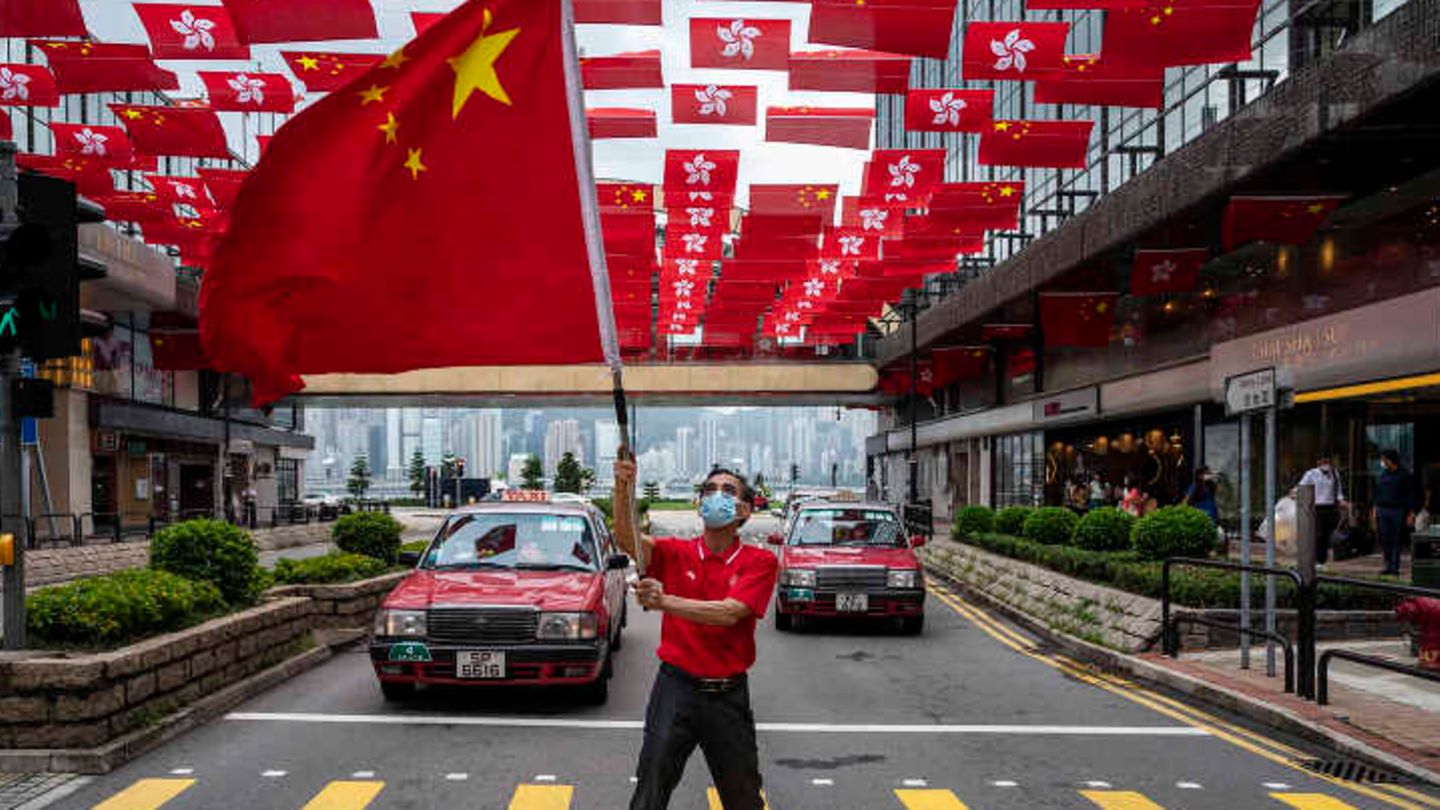Exactly a year ago, a new security law was passed in Hong Kong. Since then, more than a hundred people have been arrested, independent media shut down and critical voices stifled.
It’s been a year since China pulled the noose around Hong Kong. On June 30, 2020, a national security law (NSL) was passed in the Special Administrative Region, which should fundamentally change the city.
While two years ago pictures of the umbrella demonstrations from Hong Kong were still going around the world, it has now become quiet in the 7.5 million metropolis. Neighbors are asked to report each other, children are taught to look for traitors. The political opposition was largely crushed, pro-democratic newspapers had to close – and thousands of residents have fled abroad.
More than 100 arrests under the new law
Beijing’s long arm didn’t come overnight. Hong Kong has always been a bubble. When the former British colony was reassigned to China in 1997, Beijing guaranteed the Special Administrative Region extensive freedom of speech, assembly and freedom of the press – unimaginable on the mainland. The agreement was “one country, two systems”. But under the new head of state Xi Jinping, the Chinese Communist Party’s fear of losing control of Hong Kong grew.
When thousands of people took to the streets in Hong Kong in 2019 to protest for more democracy, Beijing put an end to the security law. Consciously vaguely worded, the law criminalizes anything that is considered separatist, terrorist, or subversive, or constitutes a conspiracy with foreign forces. According to an analysis by the UK, at least 128 people have been arrested in connection with the law in the past twelve months, including three minors and dozens of politicians and journalists. The Hong Kong Police reported 113 arrests and the National Security Bureau 115.
More than half have been charged with national security violations that can lead to life imprisonment; at least 40 people are in custody. Since the first case only came to court last week, the verdicts are still pending. But experts see the hasty arrests and slow prosecutions as a deliberate strategy to stir up fear and endanger the right to a fair trial. “It is entirely up to you whether and when you will prosecute those arrested,” said Hong Kong lawyer Eric Lai. “[Dies nicht zu tun] creates a silencing effect in society, an idea that anyone could be arbitrarily arrested without charge and thus cannot speak freely and participate in political society. ”
China’s influence is omnipresent
The “silencing effect” has long since become a reality in Hong Kong. Few people are still ready to speak out against the government in public. In the trial against the famous media entrepreneur and activist Jimmy Lai, as well as in other hearings, interviews of the defendants with foreign media were quoted. The deterrent methods are showing their effect – and many people are deeply insecure. What else can you say, what is already crossing the red line?
In the meantime, residents are clogging the police hotlines to file charges against disloyal neighbors or colleagues, as the “” reports. Government officials are ordered to sign a written version of the “biao tai” oath – a pledge of allegiance to the mainland. The Hong Kong government has released a new curriculum designed to “inspire affection for the Chinese people”. Public libraries have withdrawn dozens of books, including one on Martin Luther King Jr. and Nelson Mandela. Beijing’s growing power is also evident in the business world. More and more foreign companies are closing their locations in the former “cosmopolitan city of Asia” and are being replaced by Chinese companies.
Mainland influence is now ubiquitous in Hong Kong – yet Beijing insists on appearing and reaffirming its good intentions. When China revised Hong Kong’s electoral system to remove candidates it deemed disloyal, Beijing described the changes as “perfecting the electoral system.” When Apple Daily, one of the last major pro-democracy newspapers, was shut down, the government accused the editorial team of having abused “so-called freedom of the press” itself. When dozens of opposition politicians organized an informal primary election, Chinese officials accused them of undermining the government and arrested them.
Human rights organizations criticize security law
Human rights organizations are watching developments in Hong Kong with growing concern. In a report released on Wednesday, the authorities accused the authorities of arrest, harassment and censorship for no reason. Under the guise of “national security”, basic rights are systematically restricted and critical voices criminalized in the metropolis.
In just one year, the law brought Hong Kong “close to a police state and created a climate of fear that can be felt in all parts of society – from politics to culture, education and the media,” said Theresa Bergmann, Asia expert German Amnesty Section. Amnesty urged the authorities to drop all human rights charges. In addition, the UN Human Rights Council is to initiate an urgent debate on the human rights situation in China and Hong Kong.
Last week, the Hong Kong government accused the security law of “systematically dismantling human rights”. “The people of Hong Kong watch the Chinese government take rapid fire steps to destroy their democratic society,” said Maya Wang, chief China expert for the human rights organization. “They used to talk about politics, run for office and criticize the government, but now that is not only prohibited, it can be punished with life imprisonment.”
Recent developments have confirmed the worst fears of many Hong Kongers: the “one country, two systems” promise has finally died with the security law.
David William is a talented author who has made a name for himself in the world of writing. He is a professional author who writes on a wide range of topics, from general interest to opinion news. David is currently working as a writer at 24 hours worlds where he brings his unique perspective and in-depth research to his articles, making them both informative and engaging.




